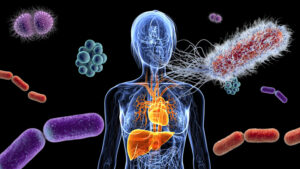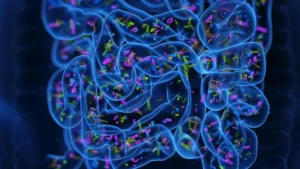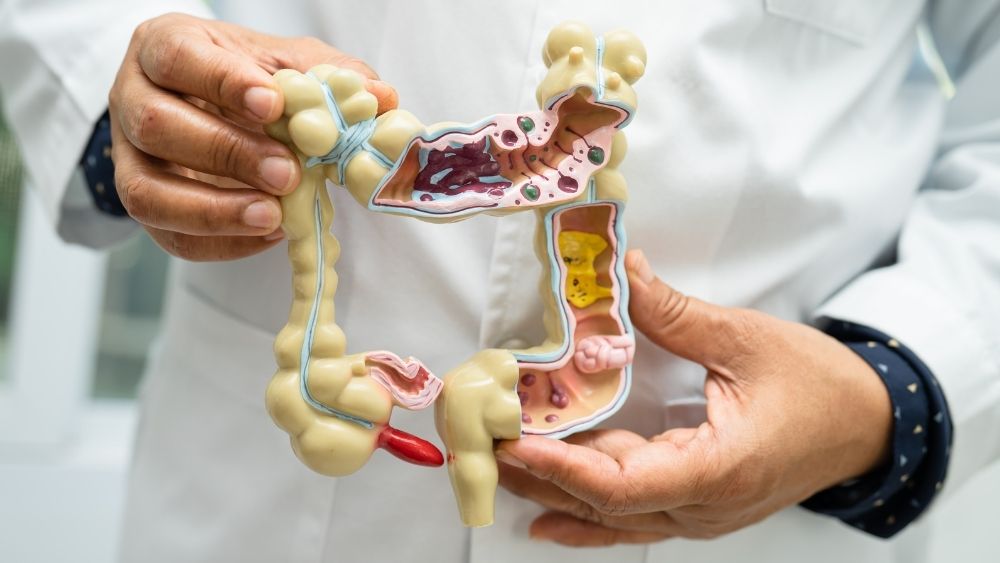The gut microbiome, a complex ecosystem of microorganisms residing in the gastrointestinal tract, plays a crucial role in maintaining human health. Recent research has shed light on its intricate workings and profound impact on various aspects of our well-being. Understanding the dynamics of the gut microbiome is essential for comprehending its implications for overall health.
The Microbial Symphony Within: Exploring the Diversity of Gut Microorganisms

The gut microbiome consists of trillions of microorganisms, including bacteria, viruses, fungi, and archaea, which coexist in a delicate balance. This microbial community forms a symbiotic relationship with the human host, influencing digestion, metabolism, immune function, and even cognitive processes. The diversity of microorganisms within the gut microbiome is staggering, with thousands of different species identified so far.
This diversity is crucial for maintaining a healthy gut environment. A balanced microbiome is characterized by a rich assortment of microbial species, each contributing unique functions to the ecosystem. However, disturbances in this equilibrium, known as dysbiosis, can have far-reaching consequences for health. Factors such as diet, lifestyle, medications, and environmental exposures can all influence the composition and diversity of the gut microbiome. That’s why it can be very beneficial to engage in a healthy sport that connects you with nature, such as horse riding, which, in addition to being a great physical activity, also involves spending time with beautiful animals such as horses, for which you can get your own personalized saddle blanket.
The significance of microbial diversity extends beyond mere numbers. Studies have shown that a greater variety of gut microbes is associated with improved health outcomes, including better immune function, reduced inflammation, and lower risk of chronic diseases. Conversely, reduced microbial diversity has been linked to conditions such as obesity, inflammatory bowel disease, and metabolic disorders. Rent a car in Beograd and visit excellent scientific and biological festivals in Europe where you can learn more interesting facts that you can use and improve your health.
The Gut-Brain Axis: Bridging the Gap Between Gut Health and Mental Well-being
The connection between the gut and the brain, known as the gut-brain axis, highlights the intricate interplay between the gut microbiome and neurological function. Emerging research suggests that the gut microbiome can influence mood, behavior, and cognitive processes through various pathways, including the production of neurotransmitters, modulation of immune responses, and communication with the central nervous system.
The bidirectional communication between the gut and the brain underscores the holistic nature of health and underscores the importance of maintaining a healthy gut microbiome for optimal mental well-being. Imbalances in the gut microbiome have been implicated in psychiatric disorders such as depression, anxiety, and autism spectrum disorders. Stress is one of the main causes of illness so you should try to eliminate it whenever you can, which can also be achieved by making sure to prevent stress patterns. Install a great roadside assistance app that will give you a lot less to worry about when you’re on a road trip because it will come in handy if a breakdown occurs.
Moreover, the gut-brain axis is increasingly recognized as a target for therapeutic interventions aimed at improving mental health outcomes. Probiotics, prebiotics, and dietary interventions designed to modulate the gut microbiome show promise in alleviating symptoms of mood disorders and enhancing cognitive function. By nurturing a healthy gut environment, individuals may promote not only physical health but also mental resilience and emotional well-being. In order to improve your mental and physical health, allow yourself an occasional pleasant vacation on the beach with a great and comfortable bikini and swimming in the warm, salty sea.
The Gut Microbiome and Immune Function: Fortifying the Body’s Defense
The gut microbiome plays a pivotal role in regulating immune function, acting as a crucial mediator between the external environment and the body’s defense mechanisms. The intestinal mucosa serves as a barrier that selectively allows nutrients to pass while preventing the entry of harmful pathogens and toxins. The gut microbiome contributes to the maintenance of this barrier function through various mechanisms, including the production of antimicrobial peptides, reinforcement of tight junctions, and stimulation of mucin production.
Furthermore, the gut microbiome influences the development and maturation of the immune system, shaping its responses to pathogens and foreign invaders. Microbial metabolites produced by gut bacteria can modulate immune cell activity, promoting tolerance to beneficial microbes while eliciting immune responses against potential threats. It’s not bad to include some dairy products in your diet and occasionally indulge in sumptuous cheese boards full of delicacies.
Dysregulation of the gut microbiome-immune axis can lead to immune-related disorders, including allergies, autoimmune diseases, and inflammatory conditions. Restoring balance to the gut microbiome through interventions such as probiotics, dietary modifications, and fecal microbiota transplantation may hold promise for modulating immune function and mitigating the risk of immune-mediated diseases. If you have a business in this field of research or you run a company that can help in this and you want to expand your business, you can contact excellent M&A business advisors who will help you to achieve that goal.
Microbiome Modulation: Strategies for Promoting Gut Health

The burgeoning field of microbiome modulation offers a diverse array of strategies for promoting gut health and optimizing microbial balance. Probiotics, live microorganisms with proven health benefits, have gained popularity as dietary supplements aimed at restoring microbial equilibrium. These beneficial bacteria, including strains of Lactobacillus and Bifidobacterium, can colonize the gut and confer various health benefits, such as enhancing digestion, bolstering immune function, and alleviating gastrointestinal symptoms.
Prebiotics, non-digestible fibers that serve as fuel for beneficial gut bacteria, represent another avenue for microbiome modulation. By selectively nourishing beneficial microbes, prebiotics can promote the growth of beneficial bacteria while inhibiting the proliferation of harmful pathogens. Common sources of prebiotics include fiber-rich foods such as fruits, vegetables, whole grains, and legumes.
Dietary interventions aimed at promoting gut health emphasize the consumption of a diverse array of plant-based foods rich in fiber, polyphenols, and other bioactive compounds. Such a diet provides the necessary nutrients and substrates to support a thriving gut microbiome, fostering microbial diversity and metabolic stability. Incorporating fermented foods such as yogurt, kefir, sauerkraut, and kimchi into the diet can also introduce beneficial bacteria into the gut, contributing to microbial balance and digestive wellness. If you offer similar products that can help with better nutrition and digestion or run some other business, a Colorado Springs SEO company can do an excellent promotion for you to get your brand out to the wider public.
Moreover, lifestyle factors such as regular exercise, stress management, and adequate sleep can influence the composition and function of the gut microbiome. Physical activity has been shown to promote microbial diversity and metabolic health, while chronic stress can disrupt gut microbial equilibrium and increase susceptibility to gastrointestinal disorders. Prioritizing sleep hygiene and adopting stress-reduction techniques such as meditation, mindfulness, and relaxation exercises can support a healthy gut microbiome and overall well-being. Some of the new smoking accessories have also proven to be good because they leave a better footprint on health as well as the environment.
Microbial Metabolites: Exploring the Impact on Host Physiology
The metabolic activities of gut bacteria produce a diverse array of bioactive compounds known as microbial metabolites, which play a crucial role in modulating host physiology and metabolic homeostasis. Short-chain fatty acids (SCFAs), such as acetate, propionate, and butyrate, are primary metabolites produced through the fermentation of dietary fibers by gut bacteria. These SCFAs serve as an energy source for colonocytes, contribute to intestinal barrier integrity, and exert anti-inflammatory effects within the gut and beyond. A science tutor in Boulder can explain this topic in depth in a simpler and easier-to-understand manner which is why his students always pass their exams with excellent results.
In addition to SCFAs, gut microbes produce a myriad of other metabolites with diverse biological activities, including neurotransmitters, vitamins, bile acids, and secondary metabolites. For example, certain bacteria can synthesize neurotransmitters such as serotonin, dopamine, and gamma-aminobutyric acid (GABA), which play key roles in regulating mood, behavior, and cognitive function. Furthermore, gut bacteria contribute to the production and metabolism of vitamins such as vitamin K, biotin, and folate, which are essential for various physiological processes.
Emerging research suggests that microbial metabolites can influence host metabolism, immune function, and neurological health, highlighting the intricate interplay between the gut microbiome and host physiology. Dysregulation of microbial metabolite production has been implicated in the pathogenesis of metabolic disorders, inflammatory diseases, and neurological conditions. Therefore, targeting microbial metabolism may represent a promising approach for therapeutic interventions aimed at promoting health and preventing disease. The health clinic in Marietta GA recommends consulting with one of their excellent doctors if you experience any symptoms of poor nutrition, as they can help you quickly find the cause and overcome the problem.
Personalized Microbiome Medicine: Tailoring Interventions for Individual Health
The concept of personalized microbiome medicine recognizes the inherent variability in microbial composition and function among individuals and emphasizes the need for tailored interventions based on individualized microbiome profiles. Advances in high-throughput sequencing technologies and computational tools have enabled the characterization of the gut microbiome with unprecedented resolution, allowing for the identification of microbial signatures associated with health and disease. In scientific centers protected by an excellent access control system from Philadelphia work is being done every day to improve this technology and bring innovations that will improve human health.
By leveraging this wealth of microbiome data, researchers and clinicians can develop personalized interventions aimed at modulating the gut microbiome to promote health and mitigate disease risk. Personalized microbiome medicine encompasses a range of approaches, including targeted probiotic and prebiotic therapies, dietary modifications informed by microbiome analysis, and fecal microbiota transplantation (FMT) for restoring microbial balance in dysbiotic conditions. It is very important to understand your microbial flora and how to keep it in balance just as it is necessary to keep your car in excellent condition at all times, which transmission service in Buffalo can help you with.
Moreover, the integration of microbiome data with other omics datasets, such as host genetics, metabolomics, and clinical parameters, holds promise for refining personalized microbiome interventions and predicting individual responses to treatment. By understanding the unique interactions between the gut microbiome and host physiology in the context of personalized health, clinicians can tailor interventions to address specific microbial imbalances and optimize therapeutic outcomes. You can read more about these advanced interventions, as well as about the importance of nutrition and maintaining the balance of the microbial flora, in interesting books of slightly more specialized literature, and it is not a bad idea to involve young people in organizations such as Readathon school fundraiser, with which they will acquire an excellent reading habit needed for the future.
Environmental Influences on the Gut Microbiome: Navigating the Impact of Exposome
In addition to genetic and host factors, environmental exposures play a significant role in shaping the composition and function of the gut microbiome. The exposome, encompassing the totality of environmental influences encountered throughout the lifespan, encompasses a broad range of factors, including diet, lifestyle, medications, geographic location, and environmental toxins. That’s why living in a quiet and pleasant neighborhood can be crucial in warding off factors that come from a bad environment, you can consider homes in Boca Falls that are perfectly built for a quiet and stylish life.
Dietary patterns exert a profound influence on the gut microbiome, with high-fiber, plant-based diets associated with greater microbial diversity and metabolic health. Conversely, diets high in processed foods, saturated fats, and added sugars have been linked to dysbiosis and an increased risk of metabolic disorders and inflammatory conditions. Furthermore, environmental pollutants, such as heavy metals, pesticides, and air pollutants, can disrupt gut microbial equilibrium and contribute to gastrointestinal dysfunction and systemic inflammation. Water is very important and you should make sure that its quality is up to par. Tap water is often rich in limescale, which, in addition to being bad for your body’s health, can also, if it accumulates in the pipes, lead to bursting, in that case, it is best to call an emergency restoration services in Charlotte that will quickly fix the problem.
Emerging Frontiers in Microbiome Research: Charting the Course for Future Discoveries

As our understanding of the gut microbiome continues to evolve, new frontiers in microbiome research are emerging, offering exciting opportunities to unravel the complexities of microbial communities and their impact on human health. Metagenomic sequencing, single-cell technologies, and multi-omics approaches are revolutionizing our ability to characterize the gut microbiome with unprecedented resolution, allowing for the identification of novel microbial taxa, functional pathways, and ecological interactions. Young students who take classes with homeschooling tutors in Bettendorf quickly master this knowledge as well as everything necessary to pass their tests.
Furthermore, advances in systems biology and computational modeling are enabling researchers to decipher the intricate networks governing microbial community dynamics and host-microbe interactions. By integrating multi-omics data and leveraging computational tools such as machine learning and network analysis, scientists can uncover hidden patterns within complex microbiome datasets and generate testable hypotheses about microbial function and host-microbe interactions. The internet provider that manages IT services in San Antonio provides excellent internet to its users so that they can research more about this and stay up to date with the constant changes in the system and advancements in medicine and biology.
In addition to technological advancements, interdisciplinary collaborations are fostering innovation and cross-fertilization of ideas across diverse fields, from microbiology and immunology to nutrition, neuroscience, and computational biology. By bringing together experts from different disciplines, we can tackle complex scientific questions and address pressing challenges in microbiome research, paving the way for transformative discoveries and novel therapeutic interventions. If you are interested in all this and want to know more, you can rent a car in Beograd and visit one of the famous science festivals in Europe, where, among other things, advances in this sphere are presented.
Conclusion
In conclusion, the gut microbiome represents a dynamic ecosystem with profound implications for human health and disease. From the modulation of microbial composition and function to the exploration of microbial metabolites and personalized interventions, the field of microbiome research is advancing rapidly, opening up new possibilities for understanding and harnessing the power of the gut microbiome to promote health and prevent disease. As we continue to unravel the mysteries of the gut microbiome and explore its connections to host physiology, we are poised to unlock new insights into the intricate interplay between microbial communities and human health, paving the way for transformative discoveries and personalized approaches to wellness. All you have to do is relax and join one of the excellent online courses that can explain these topics in more detail so that you can understand them more easily.
